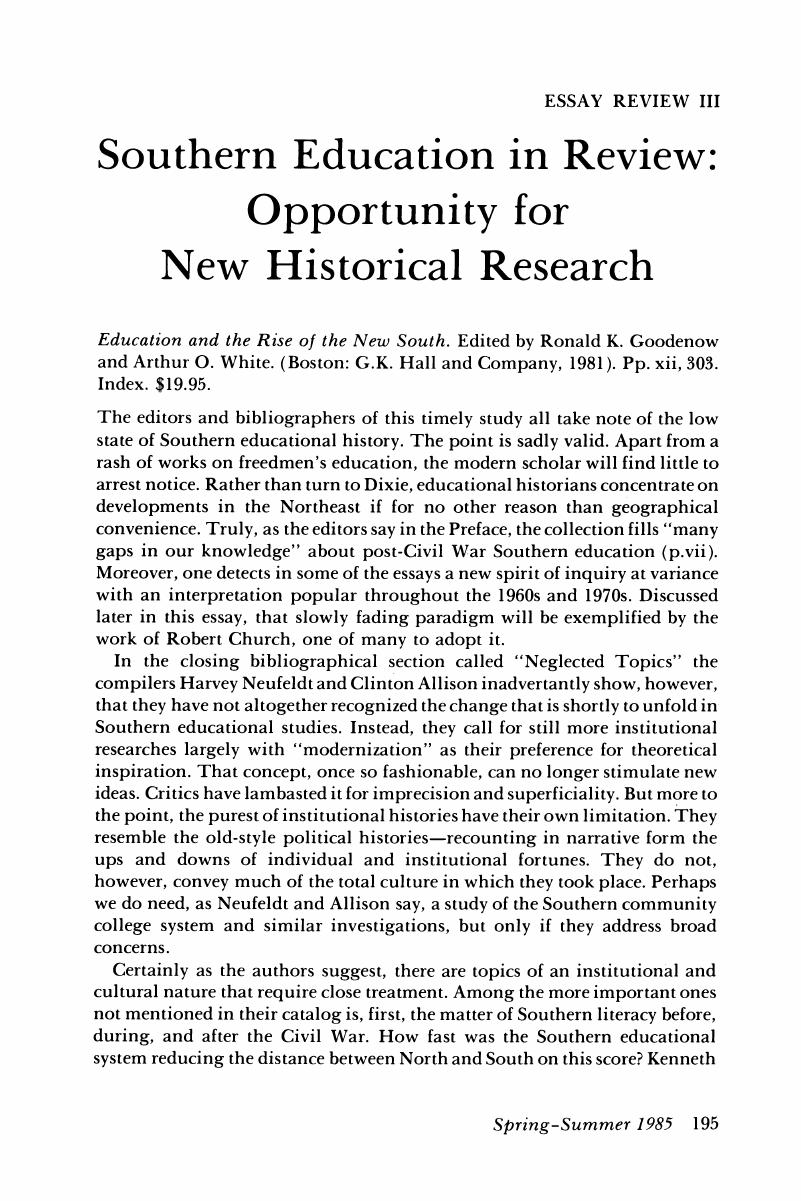Published online by Cambridge University Press: 24 February 2017

1. Lockridge, Kenneth, Literacy in Colonial New England: A Study of the Social Context of Literacy in the Pre-Modern West (New York, 1974), and his “L'Alphabetisation en Amerique, 1650–1800,” Annales E. S. C. (mai-juin, 1977): 503–18, available also in Graff, Harvey (ed.), Literary and Social Development in the West (Cambridge, 1981). See also, Graff's own work which includes Literacy in History: An Interdisciplinary Research Bibliography (New York, 1981) and The Legacies of Literacy: Continuities and Contradictions in Western Society and Culture, 2 vols. (New York and London: forthcoming).Google Scholar
2. Mills Thornton, J. III, “Fiscal Policy and the Failure of Radical Reconstruction in the Lower South,” in Morgan Kousser, J. and McPherson, James M. (eds.), Race, Region, and Reconstruction: Essays in Honor of C. Vann Woodward (New York, 1982), pp. 349–94.Google Scholar
3. Westin, Richard B., “Blacks, Educational Reform, and Politics in North Carolina, 1897–1898,” in Fraser, Walter J. Jr., and Moore, Winfred B. Jr. (eds.), The Southern Enigma: Essays on Race, Class, and Folk Culture (Westport, Conn., 1983), pp. 63–74; Spivey, Donald, Schooling for the New Slavery: Black Industrial Education, 1868–1915 (Westport, Conn., 1978).Google Scholar
4. Fishlow, Albert, “The American Common School Revival: Fact or Fancy?”, in Industrialization in Two Systems (New York, 1966), pp. 40–67.Google Scholar
5. Calhoun, Daniel, The Intelligence of a People (Princeton, 1973).Google Scholar
6. Rorabaugh, W.J., The Alcoholic Republic: An American Tradition (New York, 1980); Clark, Norman H., Deliver Us from Evil: An Interpretation of American Prohibition (New York, 1976). These re-evaluations break with the easy moralizings of such work as Rothman, David J., The Discovery of the Asylum: Social Order and Disorder in the New Republic (Boston and Toronto, 1971).Google Scholar
7. Church, Robert L. and Sedlak, Michael W., Education in the United States: An Interpretive History (New York, 1976), p. 154; Katz, Michael B., The Irony of Early School Reform: Educational Innovation in Mid-Nineteenth-Century Massachusetts (Boston, 1968); idem, Class, Bureaucracy, and Schools: The Illusion of Educational Change in America (New York, 1975 ed.); cf. Ravitch, Diane, The Revisionists Revised: A Critique of the Radical Attack on the Schools (New York, 1977).Google Scholar
8. Ibid., p. 117.Google Scholar
9. Butchart, Ronald E., Northern Schools, Southern Blacks, and Reconstruction: Freedmen's Education, 1862–1876 (Westport, 1980); Morris, Robert C., Reading, 'Riling, and Reconstruction: The Education of Freedmen in the South, 1861–1871 (Chicago, 1981); Vaughan, William Preston, Schools for All: The Blacks and Public Education in the South, 1865–1877 (Lexington, Kentucky, 1974); Jones, Jacqueline, Soldiers of Light and Love: Northern Teachers and Georgia Blacks, 1865–1873 ( Hill, Chapel, North Carolina, 1980); and Jacoway, Elizabeth, Yankee Missionaries in the South: The Penn School Experiment (Baton Rouge, Louisiana, 1980).Google Scholar
10. Woodson, Carter G., The Mis-Education of the American Negro (Washington, 1933).Google Scholar
11. Cohen, Patricia Cline, A Calculating People: The Spread of Numeracy in Early America (Chicago, 1983).Google Scholar
12. Ogbu, John U., Minority Education and Caste: The American System in Cross-Cultural Perspective (New York, 1978).Google Scholar